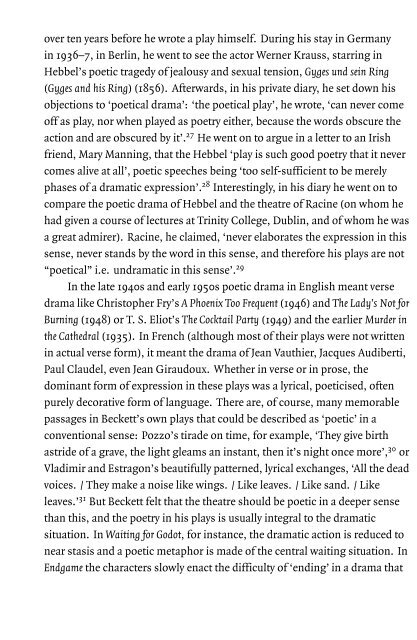Create successful ePaper yourself
Turn your PDF publications into a flip-book with our unique Google optimized e-Paper software.
over ten years before he wrote a play himself. During his stay in Germany<br />
in 1936–7, in Berlin, he went to see the actor Werner Krauss, starring in<br />
Hebbel’s poetic tragedy <strong>of</strong> jealousy and sexual tension, Gyges und sein Ring<br />
(Gyges and his Ring) (1856). Afterwards, in his private diary, he set down his<br />
objections to ‘poetical drama’: ‘the poetical play’, he wrote, ‘can never come<br />
<strong>of</strong>f as play, nor when played as poetry either, because the words obscure the<br />
action and are obscured by it’. 27 He went on to argue in a letter to an Irish<br />
friend, Mary Manning, that the Hebbel ‘play is such good poetry that it never<br />
comes alive at all’, poetic speeches being ‘too self-sufficient to be merely<br />
phases <strong>of</strong> a dramatic expression’. 28 Interestingly, in his diary he went on to<br />
compare the poetic drama <strong>of</strong> Hebbel and the theatre <strong>of</strong> Racine (on whom he<br />
had given a course <strong>of</strong> lectures at Trinity College, Dublin, and <strong>of</strong> whom he was<br />
a great admirer). Racine, he claimed, ‘never elaborates the expression in this<br />
sense, never stands by the word in this sense, and therefore his plays are not<br />
“poetical” i.e. undramatic in this sense’. 29<br />
In the late 1940s and early 1950s poetic drama in English meant verse<br />
drama like Christopher Fry’s A Phoenix Too Frequent (1946) and The Lady’s Not for<br />
Burning (1948) or T. S. Eliot’s The Cocktail Party (1949) and the earlier Murder in<br />
the Cathedral (1935). In French (although most <strong>of</strong> their plays were not written<br />
in actual verse form), it meant the drama <strong>of</strong> Jean Vauthier, Jacques Audiberti,<br />
Paul Claudel, even Jean Giraudoux. Whether in verse or in prose, the<br />
dominant form <strong>of</strong> expression in these plays was a lyrical, poeticised, <strong>of</strong>ten<br />
purely decorative form <strong>of</strong> language. There are, <strong>of</strong> course, many memorable<br />
passages in <strong>Beckett</strong>’s own plays that could be described as ‘poetic’ in a<br />
conventional sense: Pozzo’s tirade on time, for example, ‘They give birth<br />
astride <strong>of</strong> a grave, the light gleams an instant, then it’s night once more’, 30 or<br />
Vladimir and Estragon’s beautifully patterned, lyrical exchanges, ‘All the dead<br />
voices. / They make a noise like wings. / Like leaves. / Like sand. / Like<br />
leaves.’ 31 But <strong>Beckett</strong> felt that the theatre should be poetic in a deeper sense<br />
than this, and the poetry in his plays is usually integral to the dramatic<br />
situation. In Waiting for Godot, for instance, the dramatic action is reduced to<br />
near stasis and a poetic metaphor is made <strong>of</strong> the central waiting situation. In<br />
Endgame the characters slowly enact the difficulty <strong>of</strong> ‘ending’ in a drama that<br />
BECKETT AS DIRECTOR 105


